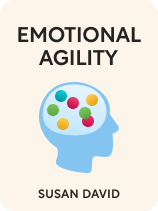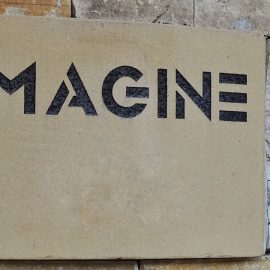
Do you let your emotional investment in something keep you from moving on when you should? If so, are you missing out on something of even greater value?
Clinical psychologist and management consultant Susan David says that emotional agility entails getting real about life and your emotional responses to it. Instead of living by false narratives, you live by true values. Part of the emotionally agile life is having a focus on the future, not the past.
Read on to learn how this principle can help you start living by your values and avoid falling back into the trap of narrative and emotional control.
Focus on the Future, Not the Past
Even after you develop the skill of emotional agility, your past still affects you—a past shaped by narrative-driven and emotion-driven decisions. Changing the life you spent years building according to your narratives won’t be easy, but living by this principle will put you on the right path: focus on the future, not the past. Live for what’s ahead of you, not for what’s behind you.
David warns against believing the sunk-cost fallacy when pursuing your goals. The sunk-cost fallacy is a narrative that insists that you should continue pursuing a goal no matter what to avoid wasting the time, money, and other resources you’ve already spent pursuing it.
Perhaps you find your career unfulfilling. You might still feel reluctant to leave a position it took years to reach. Even if another career seems more satisfying, your narrative might provoke feelings of loyalty to your company, fear of the unknown, and perhaps even guilt at the idea of “wasting” years of your life.
The sunk-cost fallacy can be a difficult narrative and set of emotions to view objectively. Nevertheless, David urges you to consider an alternative perspective: Instead of considering what you’ve invested in a goal, consider what you stand to lose by continuing to pursue that goal. If you don’t change your situation, what opportunities might you miss? By acknowledging that keeping your current goals could mean wasting opportunities, you strip the sunk-cost fallacy of its controlling power.
(Shortform note: At its foundation, the sunk-cost fallacy is about your emotional investment in a decision. So, while you might be able to outsmart your logic by considering potential loss, you can also try applying the principles of emotional agility to the emotions surrounding your investment: Label precisely why you’re having a hard time shifting your goals, objectively consider the pros and cons of staying the course, and mindfully consider how your current goals are or are not aligned with your personal values.)

———End of Preview———
Like what you just read? Read the rest of the world's best book summary and analysis of Susan David's "Emotional Agility" at Shortform.
Here's what you'll find in our full Emotional Agility summary:
- Why most people react instinctively rather than objectively
- How to live according to your values to create the life you want
- How to handle your emotions better using mindfulness techniques






